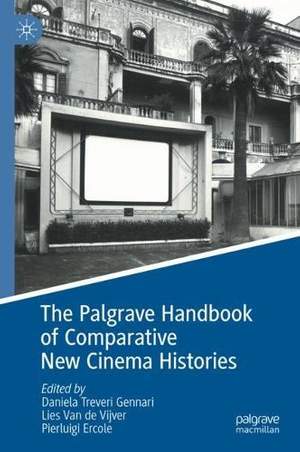
The Palgrave Handbook of Comparative New Cinema Histories
- Editor: Ercole, Pierluigi
- Editor: Treveri Gennari, Daniela
- Editor: Van de Vijver, Lies
Book
$258.50Special import
Contents
- 1. Comparing New Cinema Histories: An introduction. Daniela Treveri Gennari, Lies Van de Vijver & Pierluigi Ercole
- Part I. Local Encounters
- Introduction. Daniela Treveri Gennari, Lies Van de Vijver & Pierluigi Ercole
- 2. Comparing localised film culture in English cities: the diversity of film exhibition in
- Bristol and Liverpool. Peter Merrington, Matthew Hanchard, Bridgette Wessels
- 3. Cinema-going in Turkey between 1960 and 1980: Cinema memories, film culture and modernity. Hasan Akbulut
- 4. “A United Stand and a Concerted Effort:” Black cinema-going in Harlem and Jacksonville during the silent era. David Morton & Agata Frymus
- 5. Exhibition of national and foreign films in six Mexican cities during the Golden Age of Mexican cinema: The year of 1952. José Carlos Lozano, Blanca Chong, Efraín Delgado, Jaime Miguel González, Jorge Nieto Malpica and Brenda Muñoz
- 6. Comparing aspects of regional and local cinema differentiation through perceptions of cinema-going in post-socialist Bulgaria. Maya Nedyalkova
- 7. A comparative analysis of the Polish film market from the first years of independence to 1930. Karina Pryt
- 8. Managing constraints and stories of freedom: Comparing cinema memories from the 1950s and 60s in Sweden. Åsa Jernudd & Jono Van Belle
- 9. Film consumption and censorship pre and post Covid-19 global pandemic: A comparison on undergraduate perspective in The Bahamas. Monique Toppin
- Part II. European encounters
- Introduction. Daniela Treveri Gennari, Lies Van de Vijver & Pierluigi Ercole
- 10. “Our job is to pull audience to Soviet films with all means necessary”. State-monopolised film distribution and patterns of film exhibition in two Eastern Bloc cities in the Stalinist period: a comparative case study of Cracow (Poland) and Magdeburg
- 11. Cinephiles without films: Culture, censorship and alternative forms of film consumption in Spain and the GDR around 1960. Fernando Ramos Arenas
- 12. Discovering cinema typologies in urban cinema cultures: comparing programming strategies in Antwerp and Amsterdam, 1952- 1972. Julia Noordegraaf, Thunnis van Oort, Kathleen Lotze, Daniel Biltereyst, Philippe Meers & Ivan Kisjes
- 13. Ticket whistles and football scores: Auditory ecology, memory and the cinema experience in 1950s Gothenburg and Bari. Kim Khavar Fahlstedt & Daniela Treveri Gennari
- 14. Measuring and interpreting film preferences in autocratic states. Joseph Garncarz
- 15. Cinema-going in German-occupied territory in the Second World War. The impact of film market regulations on supply and demand in Brno, Brussels, Krakow and The Hague. Clara Pafort-Overduin, Andrzej Dębski, Terezia Porubcanska, Karina Pryt, Pavel Skop
- Part III. Global encounters
- Introduction. Daniela Treveri Gennari, Lies Van de Vijver & Pierluigi Ercole
- 16. Cinema-going in the South Asian diaspora: Indian films, entrepreneurs, and audiences in Trinidad and Durban, South Africa. James Burns
- 17. Cinema intermediaries, communities and audiences (Soviet Siberia, post-Ottoman Greek Thessaloniki, Colonial Maghreb). Morgan Corriou, Caroline Damiens, Mélisande Leventopoulos, Nefeli Liontou
- 18. German films in Latin America and the Second World War. A comparative study on Argentina and Ecuador. Marina Moguillansky & Yazmín Echeverría
- 19. Towards a global and decentralised history of film cultures. Networks of exchange among Ibero-American film clubs (1924-1958) as a case study. Ainamar Clariana & Diana Roig Sanz
- 20. Intercultural transfers in cinema dynamics. A global and digital approach to early writings on cinema through the Uruguayan periodicals archive. Pablo Suárez-Mansilla and Ventsislav Ikoff
- 21. Transnational cinema memory: Latin American women remembering cinema-going across borders. Dalila Missero


